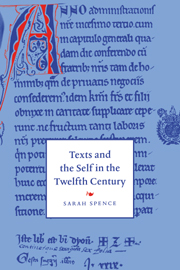Book contents
- Frontmatter
- Contents
- Acknowledgements
- 1 Corpus, body, text (and self)
- 2 Writing out the body: Abbot Suger, De administratione
- 3 Text of the body: Abelard and Guibert de Nogent
- 4 Text of the self: Guilhem IX and Jaufre Rudel, Bernart de Ventadorn and Raimbaut d'Aurenga
- 5 Writing in the vernacular: the Lais of Marie de France
- 6 Conclusion
- Works cited
- Index
- Cambridge Studies in Medieval Literature
1 - Corpus, body, text (and self)
Published online by Cambridge University Press: 08 January 2010
- Frontmatter
- Contents
- Acknowledgements
- 1 Corpus, body, text (and self)
- 2 Writing out the body: Abbot Suger, De administratione
- 3 Text of the body: Abelard and Guibert de Nogent
- 4 Text of the self: Guilhem IX and Jaufre Rudel, Bernart de Ventadorn and Raimbaut d'Aurenga
- 5 Writing in the vernacular: the Lais of Marie de France
- 6 Conclusion
- Works cited
- Index
- Cambridge Studies in Medieval Literature
Summary
The letters inscribed on Dante's forehead at the entrance to Purgatory draw on a tradition that reaches back at least as far as Augustine, a tradition which asserts an alliance between body and text as well as between sin and the wounded, naked body:
Sette P ne la fronte mi descrisse
col punton della spada, et “Fa che lavi,
quando se'dentro, queste piaghe” disse.
(Purg. ix: 112–14)(He inscribed seven “P”s on my forehead with the point of his sword, and said “Wash these wounds off when you have entered inside.”)
For both Dante and Augustine the link between body and text derives from a belief that reading correctly is a key to living correctly; the semiotics of the flesh that fascinates each author lies at the heart of both their text and their theology.
In Latin the word corpus, meaning both body and body of writing or text, points to this intersection, a nuance which, as Beryl Smalley makes clear, the early Fathers were well aware of. To a certain extent, Dante and Augustine delimit the span of the Middle Ages, and while it is interesting that they both ground their understanding of textuality in the body, it is perhaps not surprising given the dual nature of the Christian logos, the word made flesh. Of more interest is how the details of this metaphor shifted through the course of the Middle Ages; how, in short, the interrelationship of text and body changed in the intervening 800 years.
- Type
- Chapter
- Information
- Texts and the Self in the Twelfth Century , pp. 1 - 18Publisher: Cambridge University PressPrint publication year: 1996

